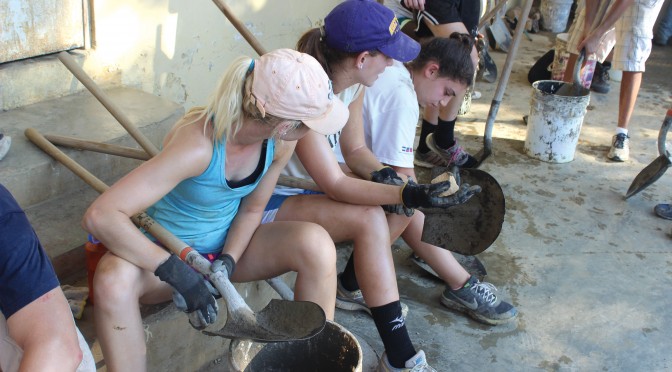
Students Helping Honduras builds during break
By: Sarah Rowan, Assistant News Editor
Nearly 60 students involved in Towson’s chapter of Students Helping Honduras traveled to Honduras during winter break to work on various building projects within the Honduran community.
Students Helping Honduras is a nonprofit student group with chapters at dozens of schools both in the United States, and internationally, that dedicates itself to ending gang violence and poverty in Honduras through education and youth empowerment.
“We want to provide more education opportunities for women and children,” Towson Students Helping Honduras Vice President Theresa Schempp (editor’s note, Schempp is a past Towerlight contributor) said. “We want children to think of school as a safe place away from gang violence.”
Honduras has the worst gang violence in the world, according to the Students Helping Honduras website.
According to the site, Honduras is the second poorest nation in the western hemisphere, with 66.2 percent of its population living in poverty. The country’s government has been rendered practically useless because of the gang violence that has permeated the neighborhoods.
Gangs use public schools as a source for recruiting new members, making school unsafe for children.
During their time in Honduras, from Jan. 10-17, the Towson chapter worked on an extension of a school to create a middle school for children and leveled out a field to provide extracurricular activities.
According to a post from Towson University Admissions, the group also worked on a library, a multi-purpose room for the bilingual school and a children’s transitional home.
The group fundraised through the fall semester to fund the project, with various projects such as the thrift shop, cupcake sales and tabling at different on-campus events.
Fundraising will continue through the spring, with the goal of raising $30,000 for another project chosen by the group.
“Any way we can help Towson and also help us is what we like to do,” Schempp said.
Junior Scott Turner traveled to Honduras with the chapter and recognized the importance of the work they did.
“For me, it was important because there’s a different kind of need that exists outside the United States,” Turner said. “We have a lot of social services here, where even if you are down on your luck or in a poor economic situation, there’s still a minimum of some services that are available. Those services just can’t be provided by some governments in other countries.”
According to Schempp, all of the on-the-ground staff members are Honduran, ensuring local empowerment for Honduran natives.
The organization also aims to create jobs for Honduran employees, and allows them to work with volunteers to help the projects to succeed.
Schempp recognized the need for international community service within the student community.
“It takes not only local service, but expands it to international service,” Schempp said. “You’re not only helping people here, but you’re able to actually travel to the country to get a different perspective and an open mind about different parts of the world. Students can expand on what they know and become more well-rounded individuals.”

